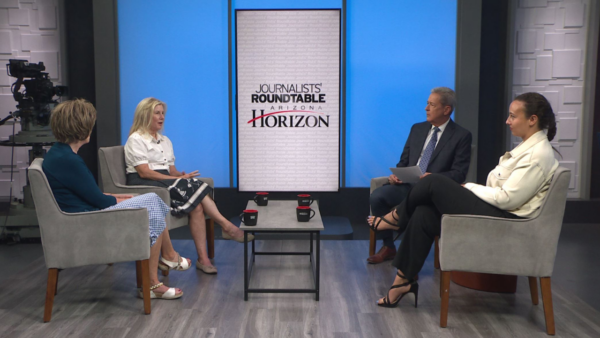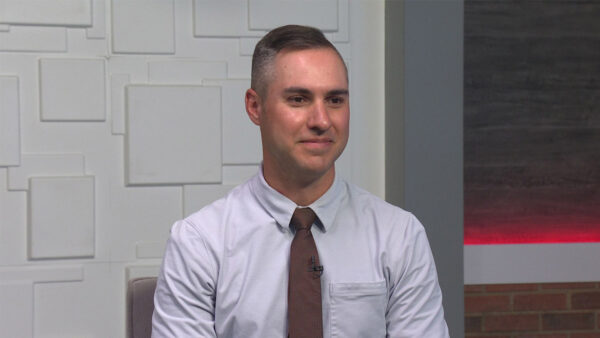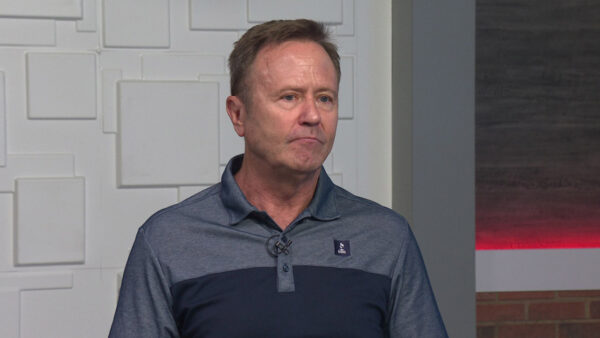Arizona has joined Fix the Debt, a nonpartisan campaign to encourage our leaders in Washington, D.C. to reach a comprehensive agreement on reforms that will improve America’s fiscal health. Learn more about the campaign from members of the Fix the Debt Arizona Steering Committee, former Arizona Attorney General and new CAP Board member, Terry Goddard, and Glenn Hamer, President and CEO of the Arizona Chamber of Commerce and Industry.
Ted Simons: Good evening and welcome to "Arizona Horizon." I'm Ted Simons. Arizona has joined 23 other states in an effort to get the Federal Government to pay its debts. The campaign to fix the debt is non-Partisan effort to get the nation on better footing. Joining me to talk about the organization and its goals are former attorney general Terry Goddard and fellow Arizona chapter steering committee member Glenn Hamer, President of the Arizona chapter, chamber, I should say, of commerce, and industry. Good to have both here. Thanks for joining us. The campaign to fix the debt, What are we talking about here?
Terry Goddard: Well, it seems a little intimidating to be on the panel as the Doomsday clock, so, maybe we can draw an analogy --
Ted Simons: There we go.
Terry Goddard: We're truly in unchartered and dangerous territory in terms of the financial condition of the country, and it's something that requires a focus, political solution, and we're not getting it. We, basically, went off the fiscal cliff, and it was a bump, and but, unfortunately, what we see now is the can has been kicked down the road. Many of the decision were put off to the discussion and probably in February or March of the Debt Ceiling change, and which is going to have to come up before Congress, and this is, frankly, an untenable situation for business and for our country because we cannot just keep playing with the economy of the United States. It needs to be -- the thing I'm so worried about is that, is that moodies and the other rating agencies are going to get in gear, and without telling anybody, they are going to downgrade the debt increasing the costs of running the Government of the United States and that's not acceptable. We are trying to come together and say time to stop it, time to make, bipartisanship statesman-like answer to, to how do we move forward in a fiscally responsible way.
Ted Simons: Indeed, that seems like the campaign is to fix the debt, and you mentioned kicking the can down the road. What constitutes not kicking the can down the road?
Glenn Hamer: Well, getting something done far beyond what was just passed in Congress to avert the fiscal cliff. I mean, that, that, that effort failed to do anything significant to, to, to deal this problem. We're talking about; you will be talking about a Doomsday clock. And we're $16 trillion in debt. We were running annual trillion dollar deficits. It's not sustainable, and at some point, that Doomsday clock will go off in terms of our, our, our national economy and, and here's, here's the thing, Ted, we don't know when it will go off. But, it will go off unless we take real action to get this situation under control.
Ted Simons: And we hear these arguments a lot. The campaign, the Arizona chapter is now up and running. And yet, there are some lawmakers who either don't see the seriousness are who take different view and say, go ahead, and let it blow up and we'll pick up the pieces later.
Glenn Hamer: Well.
Terry Goddard: There are those of us who would rather not face that future because this is the time for, for, for -- if people want to be leaders in this country and, and theoretically Congress has volunteered for that role. It's time for them to accept responsibility and, and frankly, as Glenn just said, the, in the so-called dealing with the fiscal cliff, they, basically, blinked, and made couple of minor adjustments, and passed it off to, for another time. And we cannot continue to do that. The President has called for, for some resolution and, and Congress needs to shoulder some responsibility, and it's going to have to take both parties the way that we are divided, house and Senate, Republican and Democrat, and now is the time for statesmanship and courage, and we did not see it in the last, the last go around.
Glenn Hamer: And there are blueprints out there, this whole effort really stems from, from, it follows the effort of the Simpson Bold Plan, which was a bold plan to trim trillions of dollars from our Federal debt. There are models, and it's going to take tax reform. It's going to take a lot of, a lot in terms of spending reform and getting our entitlements into place where they are sustainable.
Ted Simons: But, I mentioned, you know, picking up the pieces later, a bit of a Hyperbole, but there are some who said fall off the cliff. There are others who say, we're just not going to mess with this debt limit fully more, and how do you convince those folks in that, this is serious business?
Glenn Hamer: We need to keep -- there is no way to fix this problem. If the economy tanks. Economic growth will make all of the other solutions much easier. It's still going to take a lot in terms of entitlement reform. It will take tax reform. But, that job becomes more difficult if we go back into, into recession. And here's the good news, you have got major CEOs that, that are part of this campaign. And why are they part of this? Because there are hundreds of billions, maybe as much as $2 trillion of capital from leading corporations that could, that could, that's on the sidelines and some of that capital will come off the sidelines once there is a sense that the United States has the fiscal house in order.
Terry Goddard: That's really good point.
Ted Simons: Can you get the house in order, though, when the two sides of the house seem so, so far apart on entitlement reform. Seem so far apart on just the general nature of taxes.
Terry Goddard: Well, it's true. Right now, you have got no dialogue. You have got group people throwing up the, the, the nonnegotiable demand of, as you say, on one side entitlements and the other taxes. It's going to take some of both. Nobody thinks that we're going to get out of this easily. It was a response to an economic crisis that, that created much of this problem. And, and I think that we're going to have to find a -- Again I late to keep belaboring the bipartisan, but I think that's program we need, and maybe corporate community will be able to badger Congress into taking some action, but we saw the last time it was an abdication of responsibility. Nobody wanted to stand up and say, hey, maybe, maybe I won't be as pure to my followers as I used to be. But, I need to find a solution that works for the country, not something which meets certain ideological litmus test, and we used to have that attitude in Congress. It's time that we had it again.
Ted Simons: How do you get that? How does group like fix the debt. How does that push that kind of attitude onto the congressional delegation?
Glenn Hamer: Members of Congress listened to business leaders and, and I believe that getting this out of the realm of, of some of the, some of the, the hardened ideological positions of both parties is, is difficult to do. But, business leaders, have, have way of communicating with, with members of both parties that, that, that is bit different than, perhaps, the, the grassroots. And again, I think that members of both parties, they want to see robust economy. Probably the surest ticket to reelection, is a healthy economy, and when the economy is, is going well, and we have our, our, we have things humming, usually, people in office do, do well, and the point here is if we don't get the house in order, at some point, that, that, Doomsday clock is going to go off and, and the repercussions for those in office, I believe, will be very severe--
Terry Goddard: For those you referred to that say, let it fail. They don't know what they are talking about. Basically, saying, okay, let's run into recession, depression, and then, as Glenn has mentioned, you don't have, have the tax revenues, you don't have the wherewithal to deal with in huge problem. And, and that's responsible, that's not what national leaders ought to be talking about. And so, let's fix it. Let's not, let's not talk about the, you know, the sort letting it go. Doesn't work The idea that this is by Partisan effort, the "New York Times" had a story saying the board has deep ties to the financial industry and business industries that were pushing for corporate tax breaks if quite a while. Is it -- first, is it heavy on that side, and b, does it have to be heavy on that side?
Terry Goddard: Well, it seems a little heavy on that side but I look at the, at the list of, of major, major players here, but, nonetheless, as Glenn said, there is a self-interest factor which needs to be tied in. If these folks feel, as many them have signed up, when the administration talked about, you know, the top earners need to pay a higher level of the responsibility of paying for this country, and a lot of CEOs showed up and said that's right. We support that plan. Because we believe, in fact, this is an economy that's been good to us, and we're going to, to pay a, higher share. That's part of this dialogue, and another part is, let's say, you know, there's been a lot of talk about earmarks and special interests, in the various budgets. I think that it's an abomination that this one had huge numbers of little pork items. $100 million, I believe, for moving a rum distillery from Puerto Rico to the virgin islands. We don't have time to play with those ridiculous games. It seems if we are going to fix the economy, fixing the deficit and the budget, we have got to, basically, clear the deck for these special interest exceptions, which people seem to feel are always in order but they are not.
Ted Simons: If you look at the business leaders and engagements and this effort, there are Republicans and Democrats, and let's face it, the political people in Congress have failed. So, it's, it's a positive injection to have very well respected business leaders stand up and say, we need to get something done. And we need to get it done now, and it needs to be a meaningful effort. So, for someone watching there right for you saying this is fine and dandy, what are you going to do? I ask you, what are you going to do?
Glenn Hamer: Well, we're very fortunate, we have extinguished people like our former attorney general Terry Goddard, our speaker of the house, Andy Tobin, they don't see eye-to-eye on all the issues, but when you have adults in the room on the state level screaming to our friends in Congress and in the White House, we need to get something done, I believe, I'm, I'm bullish that, that our friends in Congress will, will listen, and get something done.
Terry Goddard: And ultimately as voters, these folks are accountable every two years, at least the funds in the house are to the voters of the country, and they need to hear from them, so I don't think that you can simply say, the responsibility has now gone to group of, of a, a bipartisan group with great intentions. People need to write their congressman because it is that important for the future of the country.
Ted Simons: Last word.
Glenn Hamer: And you have got 10,000 in Arizonans that have signed to fix the debt petition over 300,000 nation-wide, so, the general public is, is getting engaged, Ted.
Ted Simons: Very good, and good to have you here and thanks for joining us. We appreciate it.
Both: Thank you.
Terry Goddard:Former Arizona Attorney General, new CAP Board Member; Glenn Hamer:President and CEO, Arizona Chamber of Commerce and Industry;























